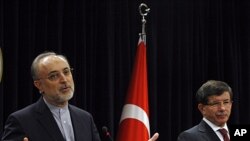The Turkish military is pressing ahead with its air and ground offensive against Kurdish militants in northern Iraq, as Ankara sought support from neighboring Iran in its fight against the rebels.
Iranian Foreign Minister Ali Akbar Salehi met with his Turkish counterpart, Ahmet Davutoglu, on Friday in Ankara, where the two announced plans to collaborate against the rebel Kurdistan Workers' Party (PKK) and its Iranian wing, the Party of Free Life of Kurdistan (PJAK).
Salehi said the two groups are "common problems" for both countries and they need to cooperate more seriously against them. Iran also has a large Kurdish minority.
Davutoglu said Turkey and Iran, from now on, will work together until what he called this terrorist threat is eliminated. It was not immediately clear what joint action the two countries are planning to take against the rebels.
Turkey launched the offensive against the Kurdish militants after a series of PKK attacks Wednesday killed 24 soldiers. Turkey says the massive air and ground operations are mainly taking place on the Turkish side of the border with Iraq, in Turkey's Cukurca region.
But in a statement posted on its website, the military said some operations are taking place in "a few" areas of northern Iraq.
Iraq on Thursday condemned the rebel attacks and also pledged to work with Ankara to prevent them in the future.
The attacks have outraged many Turks, with thousands, many of them students, marching through the capital, Ankara, on Thursday in a show of support for the military. Many chanted slogans denouncing terrorism.
The PKK has stepped up attacks against Turkish targets in recent weeks. Turkish forces have responded by increasing the number of airstrikes against suspected rebel bases in northern Iraq. Turkey called on Iraq last week to stop the Kurdish rebels from attacking Turkey from Iraqi soil, saying its "patience is running out."
Kurdish rebels have waged a campaign for autonomy in Turkey's largely Kurdish southeast since 1984. The fighting has killed more than 40,000 people. Turkey, the United States, and the European Union regard the PKK as a terrorist group.
The Turkish government has taken steps to address the demands of Kurds and other minorities for greater rights. Turkish Prime Minister Recep Tayyip Erdogan is pushing to amend the constitution, which was written in 1982 when Turkey was under military rule. But Kurdish leaders say an amended constitution should recognize the Kurds as a distinct element of the nation and grant them autonomy.
Some information for this report was provided by AP, AFP and Reuters.




